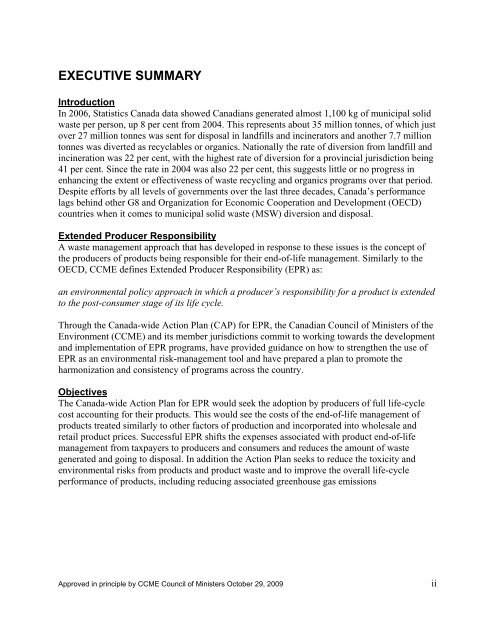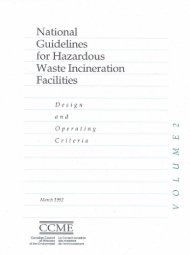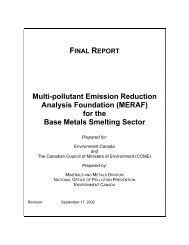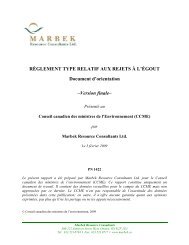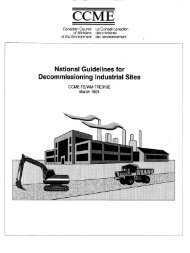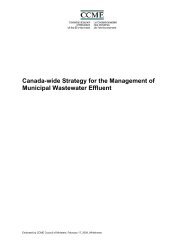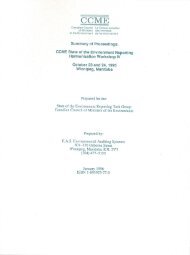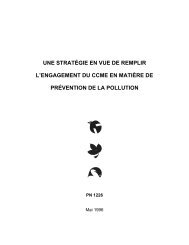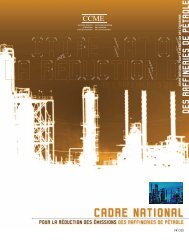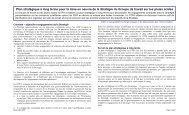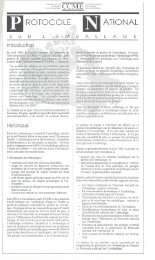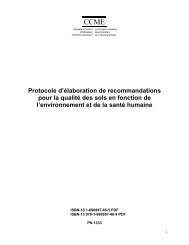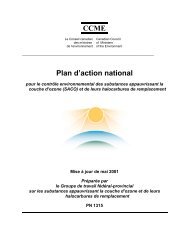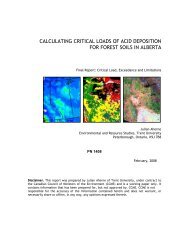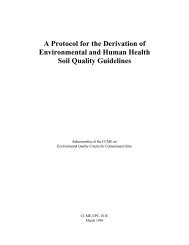Canada-Wide Action Plan for Extended Producer ... - CCME
Canada-Wide Action Plan for Extended Producer ... - CCME
Canada-Wide Action Plan for Extended Producer ... - CCME
You also want an ePaper? Increase the reach of your titles
YUMPU automatically turns print PDFs into web optimized ePapers that Google loves.
EXECUTIVE SUMMARY<br />
Introduction<br />
In 2006, Statistics <strong>Canada</strong> data showed Canadians generated almost 1,100 kg of municipal solid<br />
waste per person, up 8 per cent from 2004. This represents about 35 million tonnes, of which just<br />
over 27 million tonnes was sent <strong>for</strong> disposal in landfills and incinerators and another 7.7 million<br />
tonnes was diverted as recyclables or organics. Nationally the rate of diversion from landfill and<br />
incineration was 22 per cent, with the highest rate of diversion <strong>for</strong> a provincial jurisdiction being<br />
41 per cent. Since the rate in 2004 was also 22 per cent, this suggests little or no progress in<br />
enhancing the extent or effectiveness of waste recycling and organics programs over that period.<br />
Despite ef<strong>for</strong>ts by all levels of governments over the last three decades, <strong>Canada</strong>’s per<strong>for</strong>mance<br />
lags behind other G8 and Organization <strong>for</strong> Economic Cooperation and Development (OECD)<br />
countries when it comes to municipal solid waste (MSW) diversion and disposal.<br />
<strong>Extended</strong> <strong>Producer</strong> Responsibility<br />
A waste management approach that has developed in response to these issues is the concept of<br />
the producers of products being responsible <strong>for</strong> their end-of-life management. Similarly to the<br />
OECD, <strong>CCME</strong> defines <strong>Extended</strong> <strong>Producer</strong> Responsibility (EPR) as:<br />
an environmental policy approach in which a producer’s responsibility <strong>for</strong> a product is extended<br />
to the post-consumer stage of its life cycle.<br />
Through the <strong>Canada</strong>-wide <strong>Action</strong> <strong>Plan</strong> (CAP) <strong>for</strong> EPR, the Canadian Council of Ministers of the<br />
Environment (<strong>CCME</strong>) and its member jurisdictions commit to working towards the development<br />
and implementation of EPR programs, have provided guidance on how to strengthen the use of<br />
EPR as an environmental risk-management tool and have prepared a plan to promote the<br />
harmonization and consistency of programs across the country.<br />
Objectives<br />
The <strong>Canada</strong>-wide <strong>Action</strong> <strong>Plan</strong> <strong>for</strong> EPR would seek the adoption by producers of full life-cycle<br />
cost accounting <strong>for</strong> their products. This would see the costs of the end-of-life management of<br />
products treated similarly to other factors of production and incorporated into wholesale and<br />
retail product prices. Successful EPR shifts the expenses associated with product end-of-life<br />
management from taxpayers to producers and consumers and reduces the amount of waste<br />
generated and going to disposal. In addition the <strong>Action</strong> <strong>Plan</strong> seeks to reduce the toxicity and<br />
environmental risks from products and product waste and to improve the overall life-cycle<br />
per<strong>for</strong>mance of products, including reducing associated greenhouse gas emissions<br />
Approved in principle by <strong>CCME</strong> Council of Ministers October 29, 2009<br />
ii


